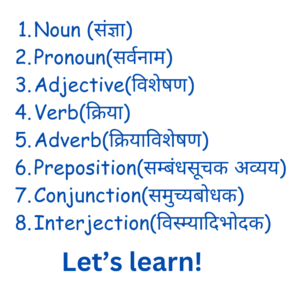Parts of Speech is the most important grammar topic in the English Language. In this post, we will learn about Parts of Speech in Hindi: Introduction and Its Types.
What is Parts of Speech? ( शब्द भेद क्या है?)
Parts of Speech ( शब्द-भेद )- Every single word we speak has a role within a Sentence. हम जो भी शब्द बोलते हैं, उसकी वाक्य में एक भूमिका होती है, कार्य होता है। Sentence को Proper Meaning & Structure देने के लिए Parts of Speech ( शब्द-भेद ) का Use किया जाता है।
* Sentence में उसके Role भूमिका के आधार पर उस शब्द का Parts of Speech ( शब्द-भेद ) Decide (तय) होता है।
Parts of Speech ( शब्द-भेद ) Grammar का एक महत्वपूर्ण Topic है। Parts of Speech ( शब्द-भेद ) से हमें Word की Category, Classification (वर्गीकरण) का पता चलता है, Sentence में उस Particular Word का क्या Role है उसके बारे में नॉलेज मिलती है।
Classification of Parts of Speech ( शब्द-भेद का वर्गीकरण )-
Parts of Speech is divided into 8 parts. ( शब्द-भेद को 8 भागो में बांटा गया है )
 Noun (संज्ञा)
Noun (संज्ञा)- Pronoun(सर्वनाम)
- Adjective(विशेषण)
- Verb(क्रिया)
- Adverb(क्रियाविशेषण)
- Preposition(सम्बंधसूचक अव्यय)
- Conjunction(समुच्यबोधक)
- Interjection(विस्म्यादिभोदक)
Let’s understand the above 8 Parts of Speech ( शब्द भेद ) in Hindi: Introduction & Its Types one by one (आइए उपरोक्त 8 Parts of Speech ( शब्द भेद ) in Hindi: Introduction & Its Types को एक-एक करके समझते हैं)-
1. Noun (संज्ञा)-
‘All the Naming words are Noun.’ (सभी नाम शब्द संज्ञा हैं।)
Another definition- ‘A Noun is the name of a person , place or thing.’ (संज्ञा किसी व्यक्ति, स्थान या वस्तु का नाम है।)
e.g. Rahul, Ramesh, Sneha, Tata, Birla, Boy, Army, Crowd, Kindness etc.
e.g. My name is Ramesh. I live in Delhi. मेरा नाम रमेश है। मैं दिल्ली में रहता हूँ।
2. Pronoun (सर्वनाम)-
A Pronoun is a word which takes place of a Noun. (सर्वनाम वह शब्द है जो संज्ञा का स्थान लेता है।)
In simple words-The word which is used as a subject in place of a Noun is called a Pronoun.
Noun के स्थान पर जिस शब्द को as a Subject के तौर पर Use करते है उसे Pronoun(सर्वनाम) कहते है।
e.g. He, She, It, They, We, You etc.
e.g. His name is Ramesh. He lives in Delhi. उसका नाम रमेश है. वह दिल्ली में रहता है.
3. Adjective (विशेषण)-
An adjective shows the quality of a noun or pronoun and provides some additional information about the noun or pronoun.
(विशेषण संज्ञा या सर्वनाम की गुणवत्ता दर्शाता है और संज्ञा या सर्वनाम के बारे में कुछ अतिरिक्त जानकारी प्रदान करता है।)
e.g. Beautiful, Bad, Clever, Honest, Some, Much, Few, Little etc.
e.g. Ramesh is an honest and intelligent student. रमेश एक ईमानदार और बुद्धिमान छात्र है।
4. Verb (क्रिया)-
In any sentence, the words that describe the action taken by the subject or its state (condition), are called verbs.
(किसी भी Sentence में जो शब्द Subject द्वारा ली गई Action या उसकी अवस्था (स्थिति) का वर्णन करते हैं, क्रिया कहलाते हैं।)
e.g. Play, Eat, Drink, Run, Come, Go etc.
e.g. Ramesh goes to school every day. रमेश प्रतिदिन स्कूल जाता है।
5. Adverb (क्रियाविशेषण)-
Words that show the quality of verbs, adjectives and other adverbs and provide some additional information about them.
(ऐसे शब्द जो क्रिया, विशेषण और अन्य क्रियाविशेषण की गुणवत्ता दर्शाते हैं और उनके बारे में कुछ अतिरिक्त जानकारी प्रदान करते हैं।)
e.g., Very, Quickly, Suddenly, Hardly, Yesterday etc.
e.g. Ramesh is very kind. His father came last night. रमेश बहुत दयालु है. कल रात उसके पिता आये।
6. Preposition (सम्बन्धसूचक शब्द,)-
Those words which show relation with the noun, pronoun or other part of the sentence are called propositions. (वे शब्द जो संज्ञा, सर्वनाम या वाक्य के अन्य भाग से संबंध दर्शाते हैं, Preposition (सम्बन्धसूचक शब्द,पूर्वसर्ग) कहलाते हैं।) e.g. From, To, With, Of etc.
e.g. Rahul is the brother of Ramesh. He lives with Ramesh. राहुल, रमेश का भाई है। वह रमेश के साथ रहता है।
7. Conjunction (संयोजक)-
Conjunctions are words that are used to join two words, phrases or sentences. (संयोजक वे शब्द हैं जिनका प्रयोग दो शब्दों, वाक्यांशों या वाक्यों को जोड़ने के लिए किया जाता है।) e.g. And, Or, Because, While, But, Otherwise etc.
e.g. Ramesh and Rahul are brothers but they do not play together. रमेश और राहुल भाई हैं लेकिन वे एक साथ नहीं खेलते हैं।
8. Interjection (विस्मयादिबोधक शब्द)–
Interjections are words used to express sudden feelings and emotions, which can be happiness, sorrow, sadness, surprise, etc. Exclamation mark (!) is used at the end of such words.
(विस्मयादिबोधक ऐसे शब्द हैं जिनका उपयोग sudden feelings and emotions को व्यक्त करने के लिए किया जाता है, जो happiness, sorrow, sadness, surprise, etc हो सकते हैं। ऐसे शब्दों के अंत में विस्मयादिबोधक चिह्न (!) का प्रयोग किया जाता है।)
e.g. Wow!, Hurrah!, Omg!, Hey! etc.
e.g. Wow! What a beautiful presentation. बहुत खूब! क्या सुन्दर प्रस्तुति है.
Hurrah! we won the match. हुर्रे! हम मैच जीते।
If you like this post Parts of Speech in Hindi: Introduction & Its Types then share it with your friends.
